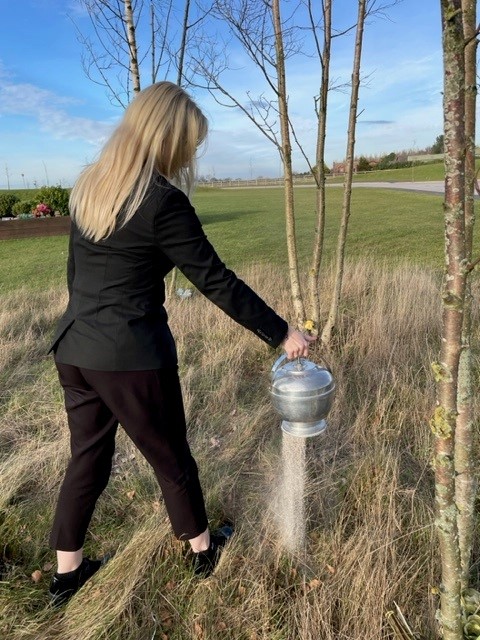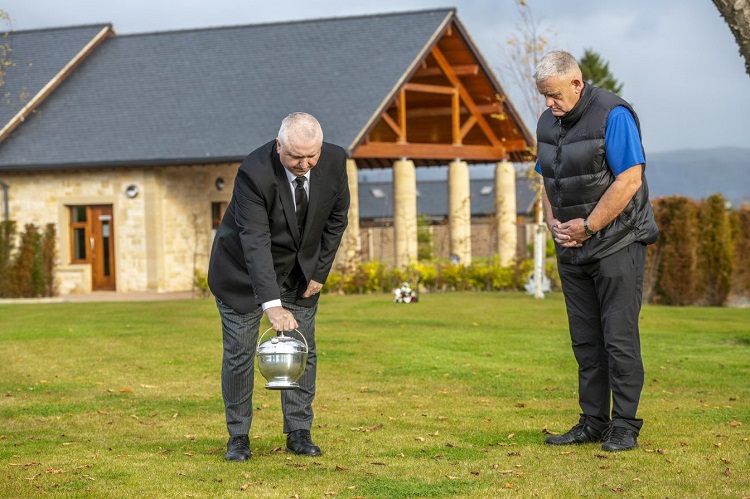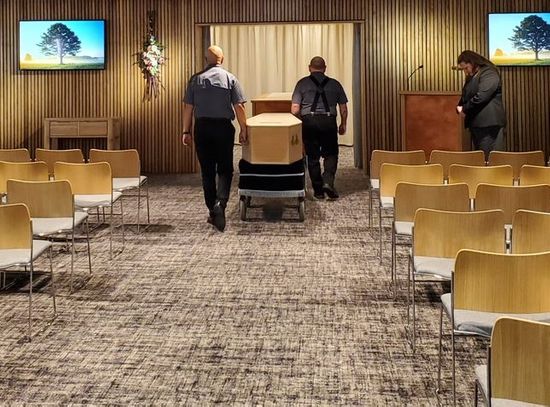The idea of scattering ashes has been around for centuries. Dating back as far as ancient times, the scattering of a loved one's ashes comes with significant meaning. It can also be an important step in the grieving process for some.
As cremations now make up more than 70% of all funerals in the UK*, it's important to understand what the process involves and where it can take place.
In this article, we'll explain what that process is, look at the legislation and laws, along with considerations you need to make before scattering ashes in the UK.
* SunLife Cost of Dying Report 2025, sunlife.co.uk/funeral-costs
In the UK, you're able to scatter ashes in a variety of open places. Whether it's on private land, public areas, or by the water, choosing the right place to scatter your loved one's ashes is a personal decision that often reflects the places that meant the most to them. Popular choices include a garden of remembrance, a green open space, over water or somewhere that was significant to the deceased in life.
Some people may leave their loved ones with wishes of where to scatter their ashes, but others may not. There are many places you can scatter ashes, but there are certain rules and permissions to be aware of depending on the location. Understanding where you can scatter ashes can help guide you in making this choice.
There are no laws in the UK that prohibit the scattering of ashes, as long as you have any necessary permits. You're also allowed to scatter ashes over any body of water or on your own private land without needing to ask permission.
However, if you'd like to scatter ashes on public or private land other than your own, it's best to ask for permission from the landowner. This includes popular places like parks, beaches and places of worship.
In certain areas, especially those with environmental protections like conservation lands, there may be additional restrictions.
Some of the most important things to remember are:
By following these steps, you can ensure that your tribute is both respectful and legally sound.

Finding the right place to scatter ashes is a deeply personal choice, often reflecting the special places your loved one cherished. Here are some thoughtful suggestions to consider, along with the key points to keep in mind for each location.
Many families find comfort in returning their loved one’s ashes to the family grave or a designated cemetery. This can provide a tangible place to visit and reflect, keeping all family members together in one place. It might also feel like a deeply rooted tradition, offering a sense of continuity and peace.
However, before scattering ashes in a cemetery, it’s crucial to check with the cemetery itself, as each may have its own rules and regulations. Unfortunately, not all cemeteries allow ashes to be scattered; some cemeteries may require permits, or they may designate specific areas for scattering.
You’ll need to check with the cemetery beforehand to make sure you’re okay to do so. If you own a plot of land within the cemetery, you should be ok to go ahead, but we still recommend reaching out ahead of time. It’s also a good idea to ensure that other family members are aware of and support the decision.
The tranquillity of a forest can provide a serene setting for scattering ashes. Many people feel a sense of peace in nature, making a forest an ideal location for a final resting place. It’s also symbolic of the cycle of life, with the ashes returning to the earth and nourishing new growth.
Access to forests in the UK is fairly straightforward, and secluded areas are easy enough to come by. If the forest is public land then you can go ahead and scatter your loved one’s ashes. However, if the area you want to use is on private land you’ll have to ask permission from the landowner. So, it’s helpful to be aware of any local regulations beforehand. It’s also essential to be mindful of the environment, choosing a spot away from sensitive wildlife habitats or conservation areas.
The Woodland Trust is the largest conservation body for forests, and they’ll typically be able to help find an appropriate area if you get in touch.
Scattering ashes on a beach can be a beautiful way to honour someone’s love of the sea. The ebb and flow of the tides, the openness of the horizon – these natural elements often bring a sense of closure and release.
While a water burial is a fairly common request, the costs and logistics involved can make it tricky, meaning many people choose to scatter ashes on a public beach instead. Beaches can be busy places, so it’s a good idea to choose a less crowded location and avoid peak times to ensure privacy and tranquillity. Remember to scatter ashes below the high tide line and away from the entry/exit points, and be mindful of other people using the beach and wind conditions.
If your loved one had a connection with the sea, lakes, or rivers, scattering their ashes over water can be an especially poignant choice. The sense of flow and movement can evoke feelings of peace and freedom, especially if the water held a particular significance.
Scattering ashes over water such as a river or the sea is a popular choice for both religious and non-religious reasons. While there’s no need to get permission from anyone, you should think about the environmental factors:
Before you go ahead and scatter ashes, here are a few important points to keep in mind:
Scattering ashes is a heartfelt way to celebrate and remember your loved one. Whether you choose a family grave, a peaceful forest, or the open sea, the location should reflect the memory and spirit of the person you’ve lost. By being mindful of permissions and the environment, you can ensure that this final act is both meaningful and respectful.
Direct cremation is a flexible and fuss-free way to make sure that your loved one receives a dignified, meaningful send-off, at a more affordable price. If your loved one has passed away, or is in the final stages of life, our team at Distinct Cremations is here 24/7 to assist you in arranging a funeral.
We provide guidance and support every step of the way, including the collection and care of your loved one, handling all the necessary paperwork, and overseeing the funeral day.

Planning ahead gives you the peace of mind that your final wishes will be honoured, while sparing your loved ones the emotional and financial strain of arranging a funeral during a difficult time. Our affordable funeral plans allow you to organise and pay for a simple, dignified service for yourself or a loved one in advance.
Each of our straightforward funeral plans includes:
If you're looking for an alternative way of scattering ashes, read our guide on what else you can do with cremation ashes. For any questions you may have about the cremation process or if you'd like to take out a funeral plan, please give one of our specialists a call.
Discover helpful articles, checklists and guidance from our experts.

Direct cremations are becoming more and more popular as a funeral option, providing a fuss-free and respectful way to say goodbye to a loved one after they’ve passed away. But what is the difference between a direct cremation and a traditional cremation?
What is a direct cremation?
Many of us are familiar with the idea of cremation, but for those who’ve never attended a service, the question of what happens at a cremation still remains. While each funeral is unique to the deceased and their families, all cremations will have some similarities.
What happens at a cremation?
The death of a loved one can be difficult and overwhelming. Understanding what you need to do when someone dies, and when to do it, can help ease the stress and confusion you may be experiencing. Which is why we’re here to take you through the key steps you need to know.
What to do when someone diesWe offer the highest level of support, but don't just take our word for it. Below are recent reviews from customers who bought a funeral with us.





